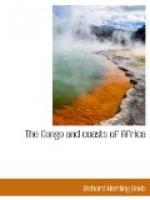A little English boy ran through the smoking-room, and they fell upon him, and quarrelled for the privilege of holding him on their knees. He was a shy, coquettish little English boy, and the boisterous, noisy men did not appeal to him. To them he meant home and family and the old nursery, papered with colored pictures from the Christmas Graphic. His stout, bare legs and tangled curls and sailor’s hat, with “H.M.S. Mars” across it, meant all that was clean and sweet-smelling in their past lives.
“I’ll arrest you for a deserter,” said the lieutenant of the gunboat. “I’ll make the consul send you back to the Mars.” He held the boy on his knee fearfully, handling him as though he were some delicate and precious treasure that might break if he dropped it.
The agent of the Oceanic Development Company, Limited, whose business in life is to drive savage Angonis out of the jungle, where he hopes in time to see the busy haunts of trade, begged for the boy with eloquent pleading.
“You’ve had the kiddie long enough now,” he urged. “Let me have him. Come here, Mr. Mars, and sit beside me, and I’ll give you fizzy water—like lemon-squash, only nicer.” He held out a wet bottle of champagne alluringly.
“No, he is coming to his consul,” that youth declared. “He’s coming to his consul for protection. You are not fit characters to associate with an innocent child. Come to me, little boy, and do not listen to those degraded persons.” So the “innocent child” seated himself between the consul and the chartered trader, and they patted his fat calves and red curls and took his minute hands in their tanned fists, eying him hungrily, like two cannibals. But the little boy was quite unconscious and inconsiderate of their hunger, and, with the cruelty of children, pulled himself free and ran away.
“He was such a nice little kiddie,” they said, apologetically, as though they felt they had been caught in some act of weakness.
“I haven’t got a card with me; I haven’t needed one for two years,” said the lieutenant, genially. “But fancy your knowing Sparks! He has the next station to mine; I’m at one end of the Shire River and he’s at the other; he patrols from Fort Johnson up to the top of the lake. I suppose you’ve heard him play the banjo, haven’t you? That’s where we hit it off—we’re both terribly keen about the banjo. I suppose if it wasn’t for my banjo, I’d go quite off my head down here. I know Sparks would. You see, I have these chaps at Chinde to talk to, and up at Tete there’s the Portuguese governor, but Sparks has only six white men scattered along Nyassa for three hundred miles.”
I had heard of Sparks and the six white men. They grew so lonely that they agreed to meet once a month at some central station and spend the night together, and they invited Sparks to attend the second meeting. But when he arrived he found that they had organized a morphine club, and the only six white men on Lake Nyassa were sitting around a table with their sleeves rolled up, giving themselves injections. Sparks told them it was a “disgusting practice,” and put back to his gunboat. I recalled the story to the lieutenant, and he laughed mournfully.




